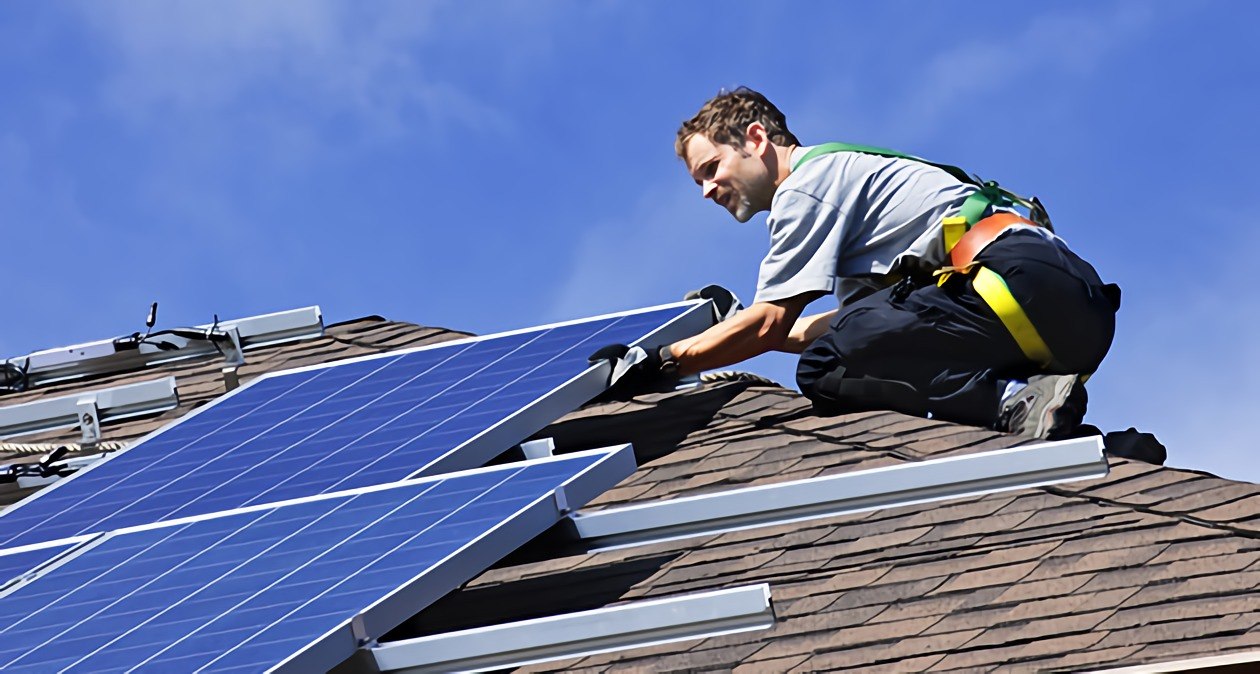RSI is a Great Training Option for Everyone
Learn more about how we can prepare you to advance your career.
While solar panel installation may not seem very different from other types of jobs in the electrical wiring industry, it does require specialized solar technician training. Solar installation certifications or licenses demonstrate that you possess the necessary knowledge and experience to work with solar technology.
However, solar licensing requirements differ by state. If you are thinking of becoming a solar panel installer, you’ll want to learn what type of training you need in order to obtain the required credentials.
Who issues solar installation certifications and licenses?
There are two main organizations that issue solar panel installation certifications:
- NABCEP, or the North American Board of Certified Energy Practitioners, is one of the leading certifiers for solar panel installation.
- The Solar Rating Certification Corporation or SRCC is another leading certifier.
States That Require Dedicated Solar Certification
The following states require a dedicated certification by either the NABCEP, SRCC, or, in some cases, other agencies:
- Alabama – Requires NABCEP or SRCC licensing
- Arizona – Requires anyone installing or repairing a solar device be certified as a solar contractor, but does not specify a particular certifying agency
- California – Requires a California solar contractors’ license OR an A/B General Building Contractors’ License plus education requirements
- Connecticut – Requires that at least one employee have NABCEP certification and that a licensed contractor hold PV-1 or E-1 license
- Delaware – NABCEP license preferred to be eligible for rebates
- Florida – Requires a certified solar contractor license
- Hawaii – Requires a solar energy systems contractor license, which is already granted to a licensed general contractor in Hawaii
- Idaho – Requires NABCEP or similar licensing plus an Idaho solar photovoltaic license
- Louisiana – Requires contractors hold licensing from an approved body
- Missouri – While there is no state requirement, Frontenac and Clarkson Valley require NABCEP certification
- New York – NABCEP certification or IBEW-NECA training required
- Pennsylvania – NABCEP, IBEW, NECA, ISPQ, or IREC certification required
- Vermont – Requires certified solar partnership
- Virginia – Requires state alternative energy systems specialization
States That Don’t Require Solar Installation Certifications
At present, there are still states that do not have dedicated solar licensing requirements.
Get Started on the Path to a New Career
Fill out our form to learn how we can help you change your life.
- Alaska
- Arkansas
- Georgia
- Illinois
- Indiana
- Iowa
- Kansas
- Mississippi
- Montana
- Nebraska
- Oklahoma
- Oregon
- Wisconsin
States with Special Solar Installation Requirements
Finally, there are a few other states with unique requirements, which are listed below:
- Colorado – While some counties, including El Paso, have solar licensing requirements, the state as a whole does not
- Kentucky – While a licensed electrician needs to be involved with aspects of solar installation, there are no requirements as to who can perform the installation
- Maine – Requires electricians install solar panels
- Maryland – While a licensed electrician needs to be involved with aspects of solar installation, there are no requirements as to who can perform the installation
- Massachusetts – Requires electricians install solar panels
- Michigan – Requires state-specific licensing
- Nevada – Requires state contractor license
- New Hampshire – Requires an electrician license
- New Jersey – Requires a home improvement registration
- New Mexico – State contractor license covers solar installation
- North Carolina – Requires an electrician license
- North Dakota
- Ohio – State contractor electrician or HVAC license required
- Rhode Island – Requires state licensing
- South Carolina – Requires electricians install solar panels
- South Dakota – Requires electrician license
- Tennessee – Requires electrician license
- Texas – Requires electrician license
- Utah – Requires contractor license
- Washington – Requires electrician license
- West Virginia – Requires electrician license
- Wyoming – Requires electrician license
Always Check the IREC Database First
Since the solar power industry is fairly new, these regulations can change anytime. Before you prepare for a certification or licensing exam, check the IREC database, which updates solar credential requirements on a weekly basis.
The Refrigeration School’s electro-mechanical technologies program helps prepare students for the exams they need to pass in order to become a solar technician. If you are interested in pursuing a career in solar technology, contact RSI today.
This blog has been labeled as archived as it may no longer contain the most up-to-date data. For a list of all current blog posts, please visit our blog homepage at https://www.rsi.edu/blog/




